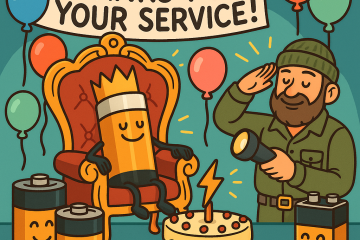The Crisis of Uberland
In our last article, I endeavored to demonstrate to you the reality that desperation plays into our international world of finance. It distorts rational thinking and actions. Today, I’m going to step away from that aspect and put currency in its proper perspective. Understand that I’m writing these pieces in a methodical order in an effort to give you the best education of these vital money matters. I have always felt that you can’t bust yourself out of prison if you don’t even know you’re in one. So read today’s article for what it is on its own and then I’ll tie these all up for you in a subsequent article in this series.
Let’s suppose that you own a small country. We’ll call it Uberland—just because. Let’s say that like most countries, you have attempted to strengthen your financial standing by investing in the financial systems of other nations which ostensibly possess a strong financial currency and a functioning economics system. This benefits you by spreading your financial strength into other markets that will have different fluctuations than your own. By doing so, one catastrophic event in your economy doesn’t need to bring your whole nation to its knees, because you will have invested heavily in the market of other nations as well. In fact, there are only a few disasters in which this investment strategy wouldn’t prove prudent. (We’ll address those later.)
So how does one country invest in other nations? Well, essentially they do it one of two ways. The most common is that they buy bonds/coupons that are backed by the country from which they purchase them. For example, Uberland could purchase $1 billion of U.S. bonds at a somewhat discounted price—say 60 cents on the dollar. So, they purchase $1 Billion worth of U.S. bonds, or better thought of as I.O.U’s, and they pay $600 million dollars for $1 Billion dollars of I.O.Us. The strategy for Uberland to take such actions would be multi-purpose. One benefit of such an act would be creating a strong political alliance. Nothing speaks friendship in international relationships quite as clearly as money. The other benefit would be financial gain to Uberland. They would be able to purchase these bonds with a face value of $1 Billion at a discount and upon the bonds aging for X number of years, they would then be able to sell them anywhere else in the world, including back to the U.S., for the realized profit of the difference between the purchase price and the face value. There’s also an added benefit of the bonds being an interest-bearing instrument. Even if it’s only a small amount of interest, purchasing a large volume of bonds earning only 1% interest could be sufficient to feed a small nation everyday. The interest-bearing component incentivizes Uberland to keep the bonds instead of just turning them in upon their maturity date and allow them to continue to accrue interest. That way the country that has sold the bonds gets to postpone the time in which they have to make good on the bonds. (Yes, even entire nations like to postpone paying a debt as long as possible.) In addition to the interest earnings, the bonds can actually be placed as collateral by Uberland on an international trading platform and generate additional lucrative profits above and beyond the other profit yields. Sounds like a great deal right?
Another facet of international investments is to literally purchase significant amounts of another nation’s currency—usually at a discount—but without the interest bearing component. If Uberland were to purchase $50 Billion dollars worth of U.S. currency and keep it in its own homeland coffers, that would be quite a boon financially to the U.S. After all, the issuance of $50 Billion to Uberland wouldn’t necessarily affect the value of the U.S. dollar immediately and the $50 Billion could easily just be printed with no accountability for the amount of currency being printed to the United States by the Federal Reserve. (U.S. Citizens are never informed of such transactions taking place.) And $50 Billion can buy a lot of things, even by haughty U.S. standards, right? Usually when a foreign nation purchases currency outright, merely keeping the money is the modus operandi—they simply have it on hand for a rainy day. Having it on their balance sheet is obviously more powerful than spending it in many instances. But watch out when this normal way of doing things is thrown a curveball.
What if your Uberland was suddenly faced with a serious crisis of a widespread, undeniable food shortage? When it comes to staving off the dangers of a food shortage, there are only a few viable options available. I assure you that investing more heavily in the currency of other nations will seem quite insignificant in comparison to just putting food on the table. It doesn’t matter how much money one has if there simply isn’t any food to buy, right? In such a scenario, money is promptly put into its proper place of value. (This is exactly why Financial Preparedness isn’t as high in prioritization in the Ten Principles of Preparedness as some might feel it should be.)
Ok. So you’re the owner/ruler of Uberland. You have mouths to feed. There simply is not enough food you can BUY within your country, and you have to wait for the seasons of Mother Nature to come and go before you can successfully GROW anymore food, regardless of how much money you’re willing to throw at the problem. So, what does this do to the VALUE of your currency?

Currency's value is based on the tangible things you can purchase with it. photo c/o www.treehugger.com
Currency only holds value based upon what tangible “stuff” it can purchase—especially if the survival of your country is reliant upon food at the present, right? Due to a poor growing season, lack of storing any extra food for a rainy day—or whatever the reason for your looming disaster, ultimately it causes a financial crisis because the strength of your currency is only as good as what it will BUY. Remember the scenes from Zimbabwe when people had to carry two huge bags of money to the market just to purchase a loaf of bread? That wasn’t a financial crisis so much as it was triggered by a crisis of access to vital, lifesaving necessities. Such scenarios always go hand in hand. A food crisis will always trigger a financial crisis. Why? Because if your currency can’t provide you with the basics that sustain life, then it’s only worth the small amount of heat it can provide you with when burned. Again, currency is only as good as the “stuff” it can buy. So, because of your food shortage, you now have a currency problem no matter what some bobble-headed dingbats in Wall Street may post on their statistics.
So, what are the citizens of Uberland to do? How are they going to survive? Cars, houses, clothing are great so long as they last, but a person can only go so far without food, right? If a nation cannot provide a currency that is valuable enough to purchase the basic necessities of survival, then that currency is useless too. (I hope I’ve conveyed that message clearly enough to get through to everyone.)
 I had one person suggest to me this past weekend that even if money couldn’t purchase “wheat” it would still have value by being able to purchase “passage” to somewhere else for safety. (*sigh* There’s always one in every crowd) Ok. Let’s think about this for just a moment. How does one obtain “passage” except by getting such a service provided to them by another living, breathing person who also needs to eat? What would an Uberland citizen use to PAY for passage to another land in hopes of greater access to food? Uberland currency? Uh. Nope. It’s not worth anything anymore because it can’t even purchase the most important of necessities. So how about gold pieces? The person or group that’s providing you with passage services from one nation to another has to eat too, right? They can’t live off of gold?! So in this instance even gold doesn’t provide you with any salvation. In other words, currency won’t do you any good. The only currency that will get anything done is FOOD. In other words, as the ruler of Uberland, you may be wise to dump all of your worthless currency investments and instead take some wise action to invest in that which cannot be replaced by money. But wait. All of your currency is worthless now just because you have a food shortage? Yes. Because whether it’s Yuan, Euro or Dollars, you can’t eat it to survive, right? The bonds are worth even less because they aren’t even currency. To put it frankly, bonds are only pieces of paper which represent other pieces of paper which hopefully represent your ability to buy “stuff.” *heavy sigh*
I had one person suggest to me this past weekend that even if money couldn’t purchase “wheat” it would still have value by being able to purchase “passage” to somewhere else for safety. (*sigh* There’s always one in every crowd) Ok. Let’s think about this for just a moment. How does one obtain “passage” except by getting such a service provided to them by another living, breathing person who also needs to eat? What would an Uberland citizen use to PAY for passage to another land in hopes of greater access to food? Uberland currency? Uh. Nope. It’s not worth anything anymore because it can’t even purchase the most important of necessities. So how about gold pieces? The person or group that’s providing you with passage services from one nation to another has to eat too, right? They can’t live off of gold?! So in this instance even gold doesn’t provide you with any salvation. In other words, currency won’t do you any good. The only currency that will get anything done is FOOD. In other words, as the ruler of Uberland, you may be wise to dump all of your worthless currency investments and instead take some wise action to invest in that which cannot be replaced by money. But wait. All of your currency is worthless now just because you have a food shortage? Yes. Because whether it’s Yuan, Euro or Dollars, you can’t eat it to survive, right? The bonds are worth even less because they aren’t even currency. To put it frankly, bonds are only pieces of paper which represent other pieces of paper which hopefully represent your ability to buy “stuff.” *heavy sigh*
So, as the ruler of Uberland, how are you feeling right about now? In order to fix your problem, you need STUFF, more particularly food, right? Dying persons aren’t very effective at manufacturing goods and services to export to other nations. Most nations are highly reliant on their ability to export their goods to other nations, period. If you don’t find a way to feed your citizens, you could literally cease to exist as a nation. So really, the only option you have is to take action to convert your foreign currency into “stuff” that provides the most food for your citizens so that you can get back to being a productive nation.
Take this article and compare it to your own household scenario as well as that which exists in our world economics right now. Understand how devastating of an impact that something like a food shortage can have our world economy as we know it. When you have a shortage of the most basic necessities, new rules come into play, and they do so with very serious ripple effects. I’ll tie this all together for you in the next two articles in this series.
Hard Core Financial Preparedness Part I
Hard Core Financial Preparedness Part III
Hard Core Financial Preparedness Part IV
To see our upcoming event schedule, click here
Check out our in-home-course programs
Subscribe to Preparedness Pro today and never miss a thing!
For any questions or comments on this article, please leave a comment on the blog site so that everyone can benefit!
Copyright Protected 2010, Preparedness Pro and Kellene. All Rights Reserved. No portion of any content on this site may be duplicated, transferred, copied, or published without written permission from the author. However, you are welcome to provide a link to the content on your site or in your written works.







5 Comments
Michael · March 30, 2010 at 3:07 pm
How fitting that while I was in the middle of reading this article, my 7-month-old son started crying because he needed a bottle. The toy that held his attention so nicely while I started reading didn’t matter to him once he realized that his stomache was empty. I thought you would all enjoy the irony of my situation.
Thanks Kellene for putting this in terms that I can understand even though I have never really understood financial stuff.
EKay · March 30, 2010 at 4:54 pm
I agree with you wholeheartedly if the crisis at hand were indeed a food shortage (which could be happening sooner than we think). But, it is also a good idea to make sure your preparedness is a well-rounded one. What if our economy, though unstable, continues to struggle, and instead of a food shortage, we experience a loss of work, or what if we experience a local power outage like the Midwest/Northeast did for long periods of time? Businesses that still profited such as grocery stores did not shut their doors until supplies were scarce – what did they do? They accepted cash. No credit cards, no checks. Food storage would be of highest benefit in the case of a lost job, but a good savings of money would help keep you with shelter and fuel for as long as possible. Money or precious metal is obviously not the top of my list for attaining self-sufficiency, but it is in there, none the less. I’m willing to take the risk that one day, it might be worthless. It is only one of many possibilities in the realm of preparedness…
Kellene · March 30, 2010 at 5:03 pm
EKay, may I suggest that you read the 10 Principles of Preparedness articles that I’ve written. You’ll see that one of the things that makes this site so much different than others is that we take the entire view of preparedness into account everyday. In order of prioritization, food is number 8 out of 10 areas of preparedness. However, financial preparedness is number 9. In other words there are 7 other areas of preparedness that have a higher priority to us being ready for what comes at us on a daily basis.
The food shortage was simply an example used in the story yesterday to illustrate the importance of “stuff” vs. money and not to be misconstrued as the be all and end all alternative to financial preparedness.
you may also want to attend my Lights Out, Now What training as it shows what kind of events can bring about a domino effect caused by just one aspect of preparedness being thrown off kilter.
EKay · March 30, 2010 at 5:53 pm
I would love to read your principles of preparedness – is there a link I can go to view it? I tried to search for it and couldn’t pull it up – or is it a class you offer? I also am interested in your training – but, I live in Las Vegas; would you ever consider a class down here – I know several people following your blog down here, and I have connections with several wards that would be interested in your classes. Please let me know if you would be interested! Until then, I appreciate and look forward to your posts!
Kellene · March 30, 2010 at 10:43 pm
Ekay, here are two of the articles that cover the 10 Principles
http://www.preparednesspro.com/blog/preparedness-on-a-budget/
http://www.preparednesspro.com/blog/ten-components-of-emergency-preparedness/
Also, I have frequently come down to Las Vegas to do training. I love going down there. If you would like to pursue that, then just communicate with Vicky at preparednesspro dot com
Also, I teach the 10 Areas of Preparedness via a Webinar as well as the Lights Out, Now What course. Simply check out schedule for details.
Comments are closed.